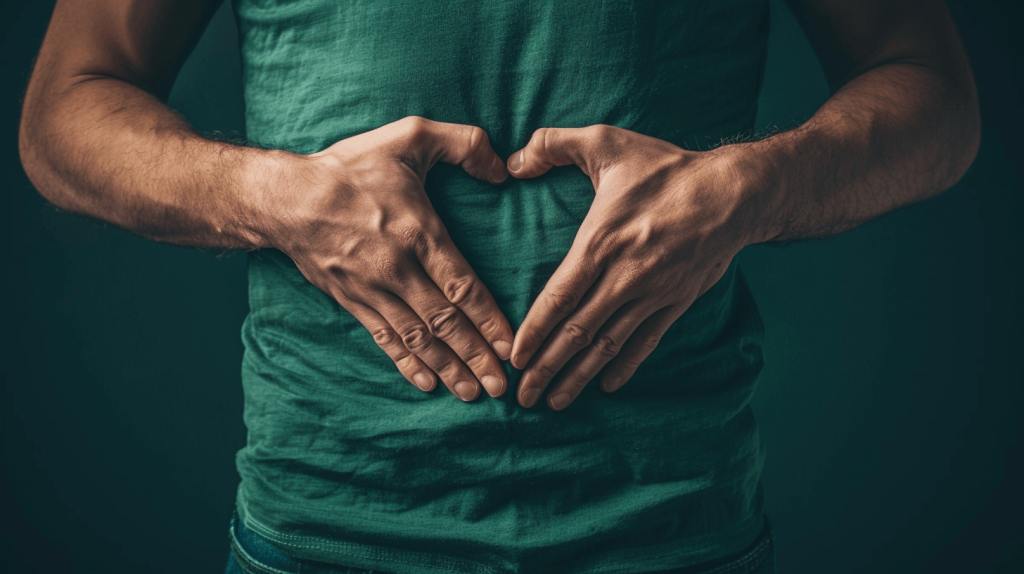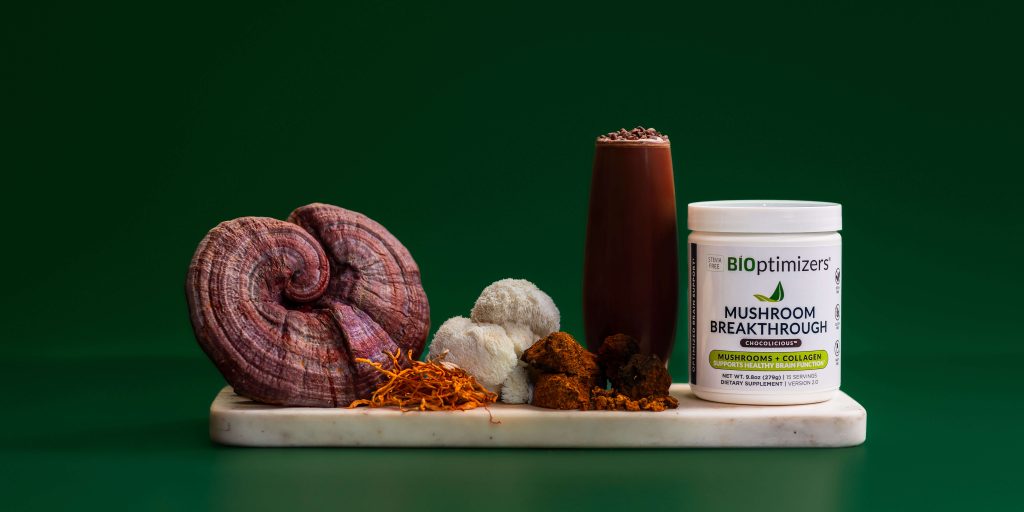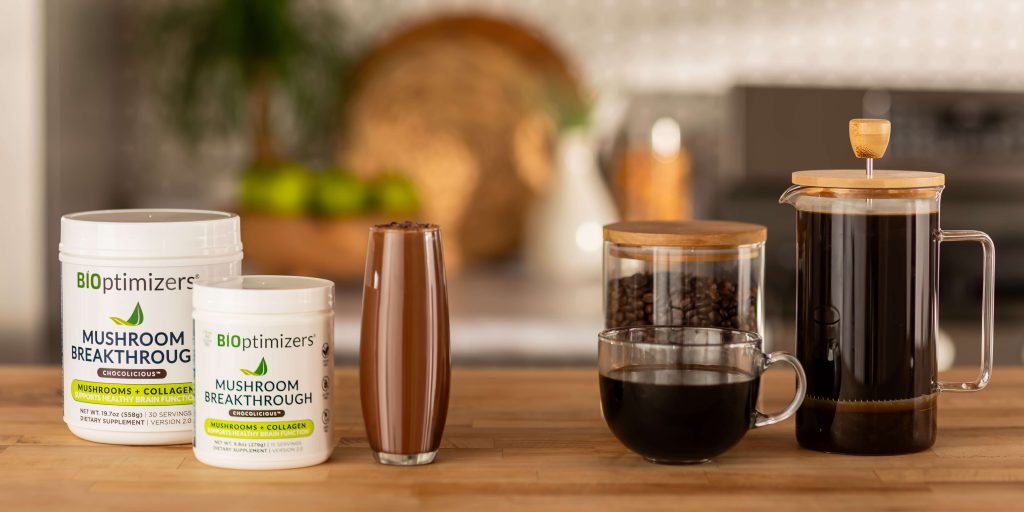
What Happens When You Drink Coffee On An Empty Stomach?


What Happens When You Drink Coffee On An Empty Stomach?
Imagine waking up to the allure of that first sip of coffee—a familiar routine shared by many. The average American consumes three cups of coffee daily, drawn to its instant perk and cognitive boost.
However, coffee can affect your gut in ways that are hard to ignore. In this article, we’ll examine what happens when you drink coffee on an empty stomach and explore whether it’s a healthy habit or one that might need some adjustments.

What Happens to Your Stomach When You Drink Coffee?
Coffee and caffeine are stimulants that don’t just wake you up–they also stimulate many gut functions. Some people find that coffee, especially first thing in the morning, leads to digestive upset. However, the effects are individual, depending on your tendency and diet. Now, let’s discuss how coffee affects each of your gut functions.
Stomach Acid Production
Coffee stimulates the production of gastrin, a hormone produced in your stomach and small intestine.
Gastrin then increases stomach acid (hydrochloric acid) in the stomach. Stomach acid is essential for digestion, sterilizing gut content, and many other digestive functions. However, without food, stimulating stomach acid like this could cause problems like discomfort, nausea, heartburn, burping, and gas, especially for people with sensitive stomachs.
A study of 40 healthy adults explored the effects of coffee intake on gastrin. Participants drank four different types of caffeinated coffee (hot and cold instant coffee, cold espresso, hot filtered coffee) each one week apart.
Researchers measured their salivary gastrin levels 15, 30, and 60 minutes after drinking. Gastrin levels increased for all types of coffee equally. They peaked at 15 minutes after consumption and returned back to pre-consumption levels after 60 minutes.
What exactly causes gastrin production? Studies point to caffeine and coffee processing as possible factors. A study of healthy adults explored the relationship between coffee processing, caffeine content, and stomach acid production.

Participants consumed different types of coffee made from green coffee beans processed in various ways, including:
- Instant and ground coffee
- Caffeine removal using ethyl acetate or methylene chloride extraction
- Different instant coffee processing temperatures (112°F or 300°F)
- Steam treatment
Researchers measured acid secretion and blood gastrin levels. The ground coffee with the highest caffeine content also caused the greatest amount of acid secretion and gastrin production.
All caffeinated coffee, no matter the processing, caused more acid secretion and gastrin production than decaffeinated coffee. There was no notable difference in acid stimulation among instant coffees compared to ground coffee.
Another study highlighted the bitter taste of caffeine as the potential reason why caffeinated coffee stimulates acid production more than decaf. Participants drank either water, a caffeine solution, or a caffeine solution with added homoeriodictyol to reduce the bitter taste.
By testing the stomach’s acidity, researchers found that the more bitter the taste, the stronger the stomach’s acid response. They believe this is due to special sensors in the mouth and stomach that detect bitter tastes, called TAS2Rs, and help control stomach acid.
Lowers Stomach Pressure
Drinking coffee can lead to lower LES (lower esophageal sphincter) pressure. LES is a muscle at the stomach’s entrance. When it’s weak, stomach acid can flow back into the throat, causing discomfort.
A review of studies explored the effects of coffee, tea, decaf coffee, and caffeine on LES. Drinking caffeinated coffee led to:
- Lower LES pressure
- Increased acid reflux
- Burning sensation in the chest
Participants experienced similar symptoms when drinking tea, but not with decaf coffee and very rarely with other drinks with caffeine. These results suggest that something other than caffeine may be causing the lower LES pressure although researchers are not sure what.

Increases Bile Production
Just beyond the stomach, in the first part of the small intestine, is the duodenum. There, food from your stomach mixes with bile and other digestive juices for further digestion.
Drinking coffee, both regular and decaf, makes the body produce more of a hormone called cholecystokinin (CCK). CCK increases bile and gallbladder functions. It also opens a valve called the Oddi sphincter, letting bile and digestive juices into the small intestine.
A study of six healthy coffee drinkers explored the relationship between coffee consumption, gallbladder contractions, and CCK concentrations. Participants drank either 165 mL or 400 mL of caffeinated coffee or 165 mL of decaf coffee.
After drinking 165 mL and 400 mL of regular and decaf coffee, participants experienced a significant increase in CCK levels and gallbladder contractions compared to those who drank a sodium chloride solution.
The increase in CCK stimulation and gallbladder contractions releases bile into the small intestine, which can help break down fats more efficiently and improve digestion.
Past research suggested that those struggling with gallstones should avoid drinking coffee. More recent research suggests drinking coffee may reduce the risk of gallstone formation.
A recent meta-analysis of several studies involving over 200,000 participants and over 11,000 cases of gallbladder stones investigated the link between coffee consumption and gallbladder stone risk. The analysis found that coffee intake was associated with a 17% lower risk of gallbladder stones in women, but not in men.
The analysis also showed that the risk of gallstones decreased with higher coffee consumption in the following way:
- 5% reduction in risk for 1 cup/day
- 11% for 2 cups/day
- 19% for 4 cups/day
- 25% for 6 cups/day
If gallstones are a concern for you, always consult your healthcare provider before making any dietary changes, including drinking coffee.
Bowel Movement Stimulation

Now onto one of the most widely recognized effects of drinking coffee – its ability to make you poop. While coffee doesn’t seem to affect movement in the small intestine, it does affect movement in the colon in around 29% of people. For some, it can happen as quickly as in four minutes.
A review of studies found that regular coffee stimulates bowel movements 23% more than decaf and 60% more than water. While caffeine likely plays a role in this stimulation, researchers believe it’s more likely to be due to increased CCK and gastrin secretion. Two studies noted the beneficial effects of coffee in relieving issues with occasional constipation.
Other Effects to Watch Out For When Drinking Coffee
Increased Cortisol
Cortisol is a steroid hormone produced by the adrenal glands located on top of each kidney. It’s often referred to as the “stress hormone” because its levels increase in response to stress. Cortisol plays a crucial role in the body’s response to stress, metabolism, immune function, and regulation of blood pressure.
Caffeine also increases cortisol secretion. In the short term, cortisol makes you feel good with some energizing and anti-inflammatory effects. However, elevated cortisol for too long has some detrimental effects.
A study with 96 healthy adults investigated the effects of caffeine and stress on cortisol secretion. Participants consumed a placebo, 300 mg, or 600 mg of caffeine at home for five days. In the lab, they consumed a placebo or three doses of 250 mg caffeine before undergoing mental or physical stress followed by a midday meal.
Researchers found that men and women start with the same cortisol levels, but stress and caffeine affect them differently. Here is what they found:
- Stress causes a greater increase in cortisol levels in men.
- Caffeine raises cortisol levels in both men and women.
- The effect of caffeine on cortisol levels is particularly noticeable after physical activity, especially in women.
Repeated caffeine intake boosts cortisol all day, regardless of gender or stress. Increased cortisol levels increase blood pressure and blood sugar.

Anxious Feelings
Caffeine is a stimulant that impacts the central nervous system. When you consume caffeinated coffee, it stimulates the central nervous system, triggering the release of adrenaline in the body. This can cause you to feel anxious or nervous.
A meta-analysis of 14 studies and over 500 participants explored the relationship between caffeine intake and anxious feelings. Researchers determined that how much caffeine you drink makes a big difference in how anxious you may feel.
The more caffeine you consume, the more at risk you are of feeling anxious. The effects are most pronounced when drinking 400 mg (about 4 cups of coffee) or more.
One element contributing to anxious feelings is the natural increase in blood pressure that occurs with coffee consumption.
Increased Blood Pressure
Coffee naturally increases your blood pressure and reduces your heart rate.
A study of 15 healthy coffee and non-coffee drinkers explored the cardiovascular effects of coffee drinking. Researchers continuously monitored heart rate and blood pressure before and after drinking either:
- Triple espresso containing 250 mg caffeine
- Decaf triple espresso
- Intravenous administration of 250 mg caffeine
- Saline
In non-coffee drinkers, coffee consumption led to significant increases in blood pressure, especially systolic blood pressure. Heart rate slightly decreased after consuming coffee in all participants. Additionally, the effects observed with decaf coffee imply that factors other than caffeine might contribute to the changes in blood pressure.
Disrupted Circadian Rhythm
Your circadian rhythm is what helps regulate your sleep and wakefulness cycle. Drinking coffee too close to bedtime can disrupt it for some people.
A study explored how drinking coffee in the evening affects the circadian rhythm compared to being in bright light, a known disrupter. Participants were placed into four groups:
- Low light with no coffee (placebo)
- Low light with coffee
- Bright light with no coffee
- Bright light with coffee
Participants drank coffee containing approximately 200 mg of caffeine three hours before their usual bedtime, with light exposure starting concurrently three hours before bedtime.
When participants consumed coffee in dim lighting, it caused a 40-minute greater delay in circadian rhythm than the low light with no coffee. Bright light alone delayed the circadian rhythm by 85 minutes and by 105 minutes with added caffeine.
To gain a deeper understanding of how caffeine affects the circadian rhythm, researchers observed cells exposed to caffeine. They found that caffeine blocks adenosine A1 receptors, which normally promote relaxation and sleepiness.
By blocking these receptors, caffeine increases cyclic adenosine monophosphate (cAMP) levels inside cells, making you feel awake. This can disrupt the circadian rhythm if you take caffeine too late in the day.
Find out other ways disrupted sleep can cause digestive problems in this article.
Is it Okay to Drink Coffee On An Empty Stomach?

Whether it’s okay to drink coffee on an empty stomach ultimately depends on your personal preference and experience. Some people may tolerate coffee well without food, while others may experience digestive discomfort or heightened caffeine effects.
It’s important to listen to your body and adjust your coffee consumption based on how you feel. If you find that drinking coffee on an empty stomach causes discomfort read on for some tips to reduce acidity.
Some people also have digestive issues later in the day, or even in bed, that may be related to coffee. You should always consult your physician for any medical concerns. However, if you suspect coffee could be the culprit, consider going off coffee for a few days or trying the following.
Ways to Reduce Stomach Acidity from Coffee
If you enjoy your daily cup of jo, but find that it causes too much stomach acid, before dropping it entirely try out some of the strategies below.
Choose a Dark Roast
A study involving nine healthy participants compared the effects of dark roast and medium roast coffee on gastric acid secretion. Dark roast coffee causes less stomach acid compared to medium roast coffee.
While both roasts had the same caffeine content, their chemical makeup was different. In the dark roast, researchers found:
- Higher levels of N-methyl pyridinium, which help reduce acid secretion
- Lower levels of (β) N-alkanoyl-5-hydroxytryptamides, chlorogenic acids, and trigonelline, which increase acid secretion
Add Salt or Milk
Adding salt during cooking is known for its ability to reduce bitter flavors,[R12] and the same principle applies to coffee. Adding just a tiny pinch of salt can help diminish the bitter taste of caffeine, which is known to potentially trigger acid secretion as discussed earlier.
Milk has the same bitterness-reducing effect; however, there has been some debate regarding whether or not adding milk reduces some of the nutritional benefits of coffee such as the bioavailability of antioxidant polyphenols.
In a study using a stomach model, researchers investigated how skimmed milk and whole milk affected the antioxidant content of coffee. They found that the processing method of coffee drinks, rather than the type of milk used, significantly influenced the bioavailability of antioxidants in coffee.
This is a concern if you’re someone who likes to go out and buy commercially prepared coffee drinks. Homogenization, thermal treatment, and pH adjustments of milk and coffee drinks decreased the antioxidant content more than the type of milk.
If you’re preparing coffee at home keep in mind that whole milk is better at protecting coffee’s antioxidant properties than skimmed milk.
Making it Bulletproof – Adding Fats
You’ve likely heard of the trend of making Bulletproof or Butter coffee. It consists of adding MCT oils or butter to your coffee. Adding fat may help slow down the caffeine absorption. Many anecdotal reports are very positive. People report:
- Increased alertness
- More Energy
- Lower appetite
- Counteracting some of the jitters
- Cognitive enhancement
While there isn’t a lot of research on this particular coffee blend, a review of six studies didn’t find more benefits than regular coffee for energy, alertness, and cognition.
Bulletproof coffee might not be the best choice for a sensitive stomach. Adding oils can cause gastrointestinal discomfort like nausea and abdominal pain. For some people, a high dose of fat, especially MCT oil in combination with coffee, leads to an abrupt loose stool. One study’s participants also stated that coffee with added fat seemed more acidic.
If you’re interested in trying this variation of coffee, go slow. Add just a small amount of oil or butter to begin with and see how that goes before adding more.

Pair it with Some Protein
Snacking on protein before drinking coffee can help by slowing down caffeine absorption. Protein takes longer to digest which can help delay the release of caffeine into your bloodstream, leading to a more gradual increase in alertness.
Additionally, protein stabilizes blood sugar levels, preventing rapid spikes and crashes in energy. This sustained energy can offset fatigue as caffeine effects wear off.
Factors Influencing Caffeine Content
A review of studies compared various factors in caffeine content. Here is a table with some highlights:
| Factor | Effect of Caffeine Content |
| Coffee Bean Type | Arabica has a naturally lower caffeine content than Robusta |
| Brewing Time | No effect |
| Water Temperature | Brewing below 100°C (212°F) reduces caffeine extraction |
| Coffee/water ratio | The more coffee per water, the higher the content(this is the greatest influence on caffeine content) |
| Coffee bean storage | No effect |
What Is the Best Time to Drink Coffee?
While you know your body best and can determine what works best for you, here are some guidelines to consider when deciding what time to enjoy your cup(s) of coffee.
After Cortisol Levels Drop Naturally
Cortisol levels naturally peak in the morning, typically reaching their highest point 30-45 minutes after waking. Drinking coffee immediately upon waking can further elevate cortisol levels beyond their normal peak.
During the hours of 8:00 am to 10:00 am, cortisol levels remain within a normal range before gradually declining throughout the day. Disrupting this natural cortisol rhythm may adversely affect our mood, behavior, cognitive function, and physical health, potentially leading to issues like weight gain and reduced task performance.
To optimize your cortisol levels and overall well-being, it may be advisable to delay consuming your first cup of coffee until mid to late morning, ideally between 9:30 and 11:30.

After Adenosine Builds Up
While caffeine increases cortisol, it blocks the neurotransmitter adenosine which is responsible for promoting sleepiness. This is one of the ways that caffeine helps you feel so awake. It inhibits adenosine receptors in the brain. When your brain doesn’t detect adenosine, then it releases chemicals to promote wakefulness.
Adenosine is at its lowest when you just wake up. By waiting until adenosine builds up, an hour or two after you wake up, it can make caffeine more effective. Some people also find themselves less likely to crash in the afternoon when they wait to drink their morning coffee later.
Stop Drinking Coffee by Early Afternoon
To ensure good sleep, most people should avoid drinking coffee close to bedtime. Caffeine clears from a healthy person’s blood in about five hours on average, though this can vary widely (1.5 to 9.5 hours) based on individual factors.
Genetics, pregnancy, altitude, and smoking can influence caffeine metabolism—pregnancy slows it down, while high altitudes and smoking speed it up.
A study of 12 healthy sleepers explored the effect of caffeine on sleep. Participants consumed 400 mg of caffeine zero, three, or six hours before their normal bedtime. Participants kept a sleep diary, and researchers tracked sleep parameters using a sleep-monitoring headband.
The study found that consuming a moderate amount of caffeine, even up to 6 hours before bedtime, significantly disrupted sleep quality.
These sleep disruptions are likely because caffeine fights against adenosine, a sleep-inducing chemical in your brain, at a specific spot called the adenosine A2A receptor. Adenosine is important for getting deep sleep. Consuming caffeine, even in the afternoon, can diminish deep sleep, leaving you waking up feeling less rested.
Some genetic factors, such as having the ADORA2A genotype, increase sensitivity to caffeine. One study found that slow caffeine metabolizers experience sleep disruptions even after drinking 50 mg of caffeine.
While this may not be true for everyone, it’s generally best to avoid caffeine beyond the early afternoon to minimize sleep disruption. Knowing your body’s response to caffeine can help you manage any sleep issues.
Consider using a tool like Biostrap to track your sleep and understand how caffeine impacts your sleep quality.
How Much Coffee Should You Drink?

Recommendations regarding coffee consumption are primarily based on managing caffeine intake.
A comprehensive review of studies advises that healthy adults should limit caffeine consumption to no more than 400 mg per day – that’s about four cups of coffee.
For pregnant women, the recommended caffeine intake is lower, at around 200 mg per day, equivalent to approximately two cups of coffee.
While evidence is less definitive regarding caffeine intake for breastfeeding women, experts generally suggest that consuming two to three cups of coffee daily is likely acceptable. Caffeine can appear in breast milk about an hour after consumption, and excessive caffeine intake may lead to fussiness and disrupted sleep patterns in babies.
It’s essential to note that newborns and premature babies metabolize caffeine more slowly, making it advisable to minimize caffeine intake during this stage.
Building Tolerance
If you’re a regular coffee drinker, you’ve probably noticed that you can build up a tolerance to caffeine over time. This is due to the adenosine receptors we discussed earlier.
Caffeine partially blocks adenosine receptors, which can make you feel more energetic and mentally focused. However, with continued caffeine consumption, your body responds by increasing the number of adenosine receptors. This adaptation can make you feel more tired over time.
As you develop a tolerance to caffeine, drinking just one cup of coffee or an energy drink may not effectively block all available receptors. This often leads regular caffeine users to increase their caffeine intake to avoid feeling fatigued.
To try and avoid going over the recommended daily caffeine limit, occasionally pause caffeine on the weekends or once a month.
This helps restore the adenosine receptors in the brain, and then when they have coffee again, it becomes more effective.
Learn more about building tolerance to caffeine and explore other alternatives in this article.
Alternative to Coffee

If you always wake up tired and groggy, needing caffeine to function every morning, it’s time to examine your sleep quality and work on optimizing your sleep. It may go hand-in-hand with reducing caffeine intake.
You can also swap coffee with green tea or herbal tea as a hot drink first thing in the morning.
Mushroom Breakthrough is also a great caffeine-free, but energy and brain-boosting alternative. It contains a blend of four powerhouse mushrooms known to boost learning and memory, and provide you with sustained energy:
- Lion’s Mane
- Chaga
- Cordyceps
- Reishi
Combined with marine and bovine collagen, Mushroom Breakthrough also helps you build healthier skin, hair, and nails.
If you like, you can even add Mushroom Breakthrough to your dark roast or instant coffee in the morning. The collagen peptides and small amounts of fat in it can buffer some of the gut-stimulating effects of coffee.
Conclusion
Ultimately, whether drinking coffee on an empty stomach is advisable depends on your individual tolerance and experience. You can help mitigate potential digestive issues by:
- Choosing dark roast coffee
- Adding salt or milk
- Being mindful of when you’re drinking – wait until after 9:30 am and stop early afternoon
If you’d like to try a new way to get a mental boost and sustained energy, try one of our three delicious flavors of Mushroom Breakthrough.
References
- Nehlig A. Effects of coffee on the Gastro-intestinal tract: A narrative review and literature update. Nutrients. 2022;14(2):399. doi:10.3390/nu14020399
- Papakonstantinou E, Kechribari I, Sotirakoglou Κ, et al. Acute effects of coffee consumption on self-reported gastrointestinal symptoms, blood pressure and stress indices in healthy individuals. Nutr J. 2015;15(1). doi:10.1186/s12937-016-0146-0
- Van Deventer G, Kamemoto E, Kuznicki JT, Heckert DC, Schulte MC. Lower esophageal sphincter pressure, acid secretion, and blood gastrin after coffee consumption. Dig Dis Sci. 1992;37(4):558-569. doi:10.1007/bf01307580
- Liszt KI, Ley JP, Lieder B, et al. Caffeine induces gastric acid secretion via bitter taste signaling in gastric parietal cells. Proc Natl Acad Sci U S A. 2017;114(30):E6260. doi:10.1073/pnas.1703728114
- Douglas BR, Jansen JB, Tham RT, Lamers CB. Coffee stimulation of cholecystokinin release and gallbladder contraction in humans. Am J Clin Nutr. 1990;52(3):553-556. doi:10.1093/ajcn/52.3.553
- Zhang YP, Li WQ, Sun YL, Zhu RT, Wang WJ. Systematic review with meta‐analysis: coffee consumption and the risk of gallstone disease. Aliment Pharmacol Ther. 2015;42(6):637-648. doi:10.1111/apt.13328
- Lovallo WR, Farag NH, Vincent AS, Thomas TL, Wilson MF. Cortisol responses to mental stress, exercise, and meals following caffeine intake in men and women. Pharmacol Biochem Behav. 2006;83(3):441-447. doi:10.1016/j.pbb.2006.03.005
- Liu C, Wang L, Zhang C, et al. Caffeine intake and anxiety: a meta-analysis. Front Psychol. 2024;15. doi:10.3389/fpsyg.2024.1270246
- Corti R, Binggeli C, Sudano I, et al. Coffee Acutely increases sympathetic nerve activity and blood pressure independently of caffeine content: Role of habitual versus nonhabitual drinking. Circulation. 2002;106(23):2935-2940. doi:10.1161/01.cir.0000046228.97025.3a
- Burke TM, Markwald RR, McHill AW, et al. Effects of caffeine on the human circadian clock in vivo and in vitro. Sci Transl Med. 2015;7(305):305ra146. doi:10.1126/scitranslmed.aac5125
- Rubach M, Lang R, Bytof G, et al. A dark brown roast coffee blend is less effective at stimulating gastric acid secretion in healthy volunteers compared to a medium roast market blend. Mol Nutr Food Res. 2014;58(6):1370-1373. doi:10.1002/mnfr.201300890
- Breslin PAS, Beauchamp GK. Salt enhances flavour by suppressing bitterness. Nature. 1997;387(6633):563-563. doi:10.1038/42388
- Quan W, Qie X, Chen Y, et al. Effect of milk addition and processing on the antioxidant capacity and phenolic bioaccessibility of coffee by using an in vitro gastrointestinal digestion model. Food Chem. 2020;308(125598):125598. doi:10.1016/j.foodchem.2019.125598
- Goldman DM, Lambert K, Quarshie M, Craddock JC. Assessing the validity of Bulletproof Coffee’s claims. Beverages. 2023;9(4):101. doi:10.3390/beverages9040101
- Baumeister A, Gardemann J, Fobker M, Spiegler V, Fischer T. Short-term influence of caffeine and medium-chain triglycerides on ketogenesis: A controlled double-blind intervention study. J Nutr Metab. 2021;2021:1-9. doi:10.1155/2021/1861567
- Olechno E, Puścion-Jakubik A, Zujko ME, Socha K. Influence of various factors on caffeine content in coffee brews. Foods. 2021;10(6):1208. doi:10.3390/foods10061208
- Mohd Azmi NAS, Juliana N, Azmani S, et al. Cortisol on circadian rhythm and its effect on cardiovascular system. Int J Environ Res Public Health. 2021;18(2):676. doi:10.3390/ijerph18020676
- Reichert CF, Deboer T, Landolt HP. Adenosine, caffeine, and sleep–wake regulation: state of the science and perspectives. J Sleep Res. 2022;31(4). doi:10.1111/jsr.13597
- Gleason JL, Tekola-Ayele F, Sundaram R, et al. Association between maternal caffeine consumption and metabolism and neonatal anthropometry: A secondary analysis of the NICHD fetal growth studies-singletons. JAMA Netw Open. 2021;4(3):e213238. doi:10.1001/jamanetworkopen.2021.3238
- Kamimori GH, Brunhart AE, Eddington ND, et al. Effects of altitude (4300 M) on the pharmacokinetics of caffeine and cardio-green in humans. Eur J Clin Pharmacol. 1995;48(2). doi:10.1007/bf00192744
- Institute of Medicine (US) Committee on Military Nutrition Research. Pharmacology of Caffeine. National Academies Press; 2001.
- Drake C, Roehrs T, Shambroom J, Roth T. Caffeine effects on sleep taken 0, 3, or 6 hours before going to bed. J Clin Sleep Med. 2013;09(11):1195-1200. doi:10.5664/jcsm.3170
- Erblang M, Drogou C, Gomez-Merino D, et al. The impact of genetic variations in ADORA2A in the association between caffeine consumption and sleep. Genes (Basel). 2019;10(12):1021. doi:10.3390/genes10121021
- Temple JL, Bernard C, Lipshultz SE, Czachor JD, Westphal JA, Mestre MA. The safety of ingested caffeine: A comprehensive review. Front Psychiatry. 2017;8:257730. doi:10.3389/fpsyt.2017.00080
- Caffeine. National Institute of Child Health and Human Development; 2024.
- Lara B, Ruiz-Moreno C, Salinero JJ, Del Coso J. Time course of tolerance to the performance benefits of caffeine. PLoS One. 2019;14(1):e0210275. doi:10.1371/journal.pone.0210275
2 Comments
Leave a Comment
You must be logged in to post a comment.

I’m still learning from you, while I’m trying to reach my goals. I definitely enjoy reading all that is written on your website.Keep the tips coming. I loved it!
I am glad you enjoy reading the articles.